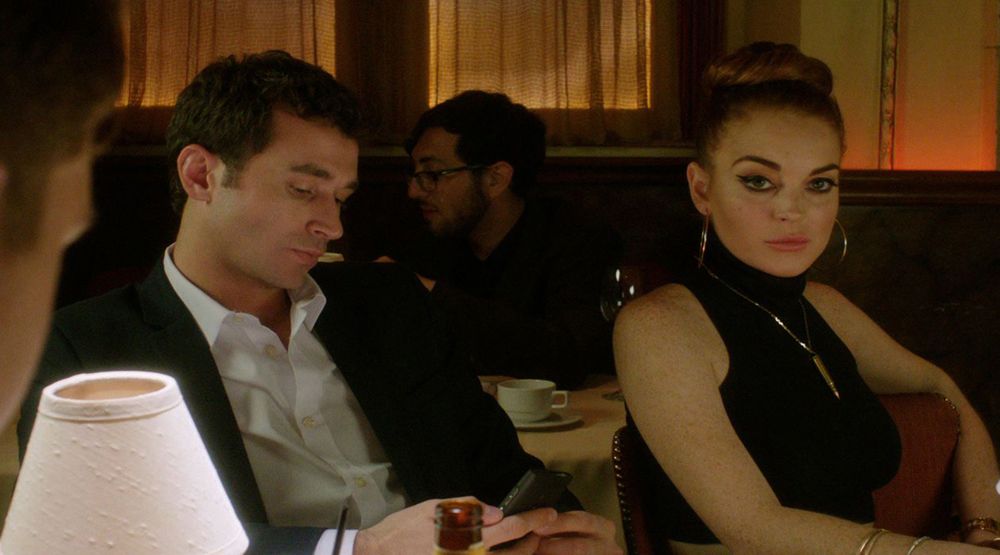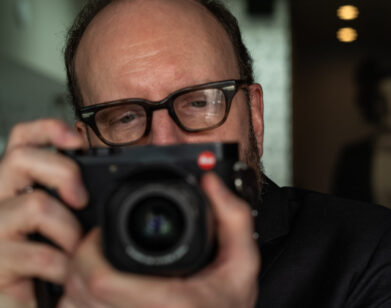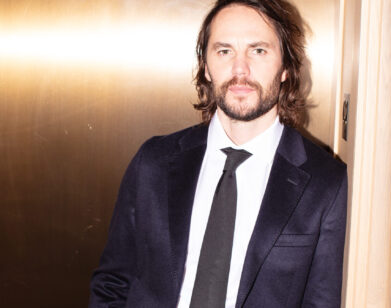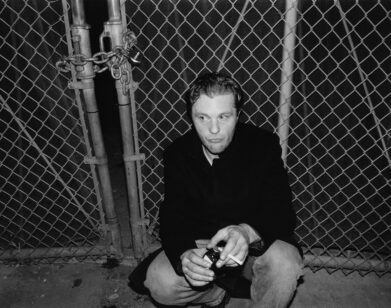Into the Canyons

ABOVE: JAMES DEEN AND LINDSAY LOHAN IN THE CANYONS
The Canyons doesn’t come out until Friday, but most people already have an opinion on Bret Easton Ellis and Paul Schrader’s film. Since Ellis, Schrader, and producer Braxton Pope announced they were collaborating on a project in 2012, The Canyons popped up in trade rags, tabloids, and The New York Times. It’s not difficult to see why: an early Kickstarter-funded film, Ellis, Schrader, and Pope advertised open casting calls via social media before settling on porn star James Deen as the male protagonist, Christian, and the ever-troubled Lindsay Lohan as his girlfriend Tara. Deen and Lohan seemed like a pair destined to combust and in January, New York Times Magazine writer Stephen Rodrick published a now infamous article detailing a tumultuous shoot filled with tantrums from erratic actors.
Schrader and Pope, however, remain unfazed. Veterans of the film industry, Schrader started his career as a screenwriter, penning Taxi Driver (1976), Raging Bull (1980), and American Gigolo (1980), and Pope recently produced the acclaimed The Source Family documentary. The two are proud of their lyrical film: proud of the performances they coaxed out of Deen and Lohan and the attention afforded to their microbudget indie.
On Sunday, we spoke with Schrader and Pope about what it means to be a Bret Easton Ellis character, unconventional casting choices, and the confidence they have in The Canyons.
EMMA BROWN: Before you made the final cut, you screened the film for some of your friends in the industry, including Steven Soderbergh. Who gave you the best advice?
PAUL SCHRADER: The best advice is essentially that thing in the back of your mind that you really aren’t sure of, and when you start to hear other people bring up the same concerns, you say, “Okay, let’s address that.”
BRAXTON POPE: We didn’t focus-group the movie, and we didn’t have the kind of systematic feedback that you get when you do a studio movie. Here in L.A., I showed it to Sasha Grey. I was interested in hearing what she had to say, because her experiences mirror James’ when she did Soderbergh’s The Girlfriend Experience (2009).
BROWN: The protagonist, Christian, maintains that he loves Tara “in his own way.” When he’s so narcissistic and cruel, does his own way even count as love?
SCHRADER: Mr. Ellis’s definitions of love are not what the next person’s might be. This is not a definition that I would consider valid. It’s a kind of possession, a kind of materialism rather than a romantic emotion.
BROWN: Is there any hope for Christian?
SCHRADER: I don’t think so. Is Christian a real-life person? I don’t know. He belongs in that universe of Bret’s characters, who are emblematic of certain things in society. Bret is not a highly realistic writer; you don’t read Bret’s books and say, “Oh, this is exactly how it is.” So Christian is kind of a stand-in for this moment in American culture.
POPE: I think that’s exactly right. The characters that Bret writes share certain traits—often live in cities, have a certain moral ambiguity, and come from a certain class. And I think that Bret is a huge consumer of culture, a creator of culture. Although on some level he is sort of a cultural anthropologist, as Paul says, at times he is writing characters that are not specific realizations of a given person but drift more towards a type in society.
BROWN: Do you think the same goes to Tara?
SCHRADER: Yes, a little less so. Tara is an interesting example because Bret viewed the character of Tara as more submissive than I did. Initially, he was opposed to casting Lindsay, because she is in no way a submissive kind of actress. But now, looking back at the film, he sees that the story of the character became more interesting because she was in your face rather than weak. I think Bret has acknowledged that Lindsay brought something to that character that he failed to do as a writer.
BROWN: Why do you think it’s so hard to adapt Bret’s work to film?
SCHRADER: Because he writes words. Words are a completely different form of expression. The word P-E-N-I-S is an entirely different form of communication than a photograph of the same thing. He can tie along the verbiage of excess in a way that creates its own reality—in a way that cannot be duplicated with imagery. I personally feel that I captured Bret’s world here. I even feel like the film is more him than me. He feels the opposite, and I guess that’s the definition of a good film collaboration.
BROWN: People seem to dismiss all of the film adaptations of Bret’s books as failures, which surprised me, because American Psycho is a great film.
SCHRADER: I thought it was, too. Bret would not agree with you, I don’t know why. And who knows what Bret actually feels about The Canyons. Maybe in a year he will give an interview where he says, “I think the film sucked!” That’s not beyond him.
POPE: I think the adaptation of Bret’s work has spanned the range. American Psycho has actually aged well. Christian Bale gave an incredible performance, a breakout performance. I think it plays better today than perhaps when it came out. There have been movies that have not been very successful, which Bret acknowledges, such as The Informers—which was not able to access and represent the tone of Bret’s writing. In some ways, they played that film straight—long stretches have a feel of melodrama without any irony, without any critical distance.
SCHRADER: When a certain amount of money has been invested, the rules change. If we had been financed conventionally, we would not have been able to cast James or Lindsay. As soon as the money comes in, they start looking at the script and try to make it more audience-friendly, and those changes weren’t made in this script. I also think it’s a mistake in Bret’s adaptations to bring in the “gods”—I think the parents are much more interesting off-screen. The moment they walk on screen, they are revealed to be normal human beings, whereas in the character’s mind they are mythic figures, and if we never actually meet them, they can stay in that realm. Once they show up and it’s Mickey Rourke or Billy Bob Thorton, their power as parental figures has dissipated.
BROWN: You’ve mentioned that you were initially resistant to the idea of casting James. When did you change your mind, and what made you change your mind?
SCHRADER: I started changing my mind when Lindsay got involved. I was playing it out with James because of Bret’s interest in him and because he was good, but I thought at the end of the conversation it would not be him. Then Lindsay got involved and I saw the post-empire fascination of pulling in an iconic figure from two cultures—the adult culture and the celebrity culture —and bringing them together in essentially an intellectual enterprise by Bret and myself. I started to feel like a buzz; it started to feel cool to me.
POPE: James occupies this stage in adult films that’s unique: he has this constituency of adolescent girls who you usually don’t associate as being consumers of graphic, adult content. James comes across as an extremely non-porny guy. So James as a cultural figure, as the most successful male performer in his industry, was interesting. Of course, the biggest assessment were his auditions. There was no disincentive to make the bold choice. We felt that aesthetically and creatively, that was the best actor for the role.
SCHRADER: I remember saying to Braxton that, if you can’t take a chance with your own money, when can you take a fucking chance? I don’t know if you consume much of James’ work, but he has done very different things. He has done some extremely unpleasant kind of work, and he’s done the boy next door—the pizza boy, and rape fantasy porn, which I find upsetting. One of the things that attracted Bret was that he could do both. I had never heard of him and Braxton had not either—but Bret said that Deen’s ability to be sweet and mean in equal measure and with equal credibility was the thing that kicked in his mind while he was writing the script.
BROWN: Do you think that James and Lindsay have a future in feature films?
SCHRADER: Those are two totally different questions. James, I think he will get work if he wants it. He’s not entirely sure if he even wants it. He went back into his adult work the day after we quit, and he’s still doing it. I recently had a phone conversation where he complained that if he went to the Venice Film Festival, he would lose money from his work. And I had to say to him, “I think your priorities are a little screwed up here. This is an enormous honor, and you’re going to lose four days of porn work for those honors.” So, that’s James. With Lindsay, people want to hire her. People like her; she’s extraordinarily famous, extraordinarily talented. She has to create a reputation for reliability, and I don’t know how she’s going to do that. If she can do that again, people are going to line up to hire her.
POPE: James actually comes in extremely prepared; he’s very punctual. All of the things that you expect of professional actors, James delivers to the point where it eliminates any concerns you might have from someone who comes from such a different filmmaking culture. But, as Paul said, he’s really unsure about how much he wants mainstream opportunities. He really can’t imagine a time when he would forsake the adult film world, because that’s such an essential component of who he is. With Lindsay, it really boils down to one question, which is personal discipline. Lindsay can have the career of anyone she wants to have, but it’s all an internal voice for her.
BROWN: Stephen Rodrick’s story in The New York Times Magazine focused on how problematic the shoot was—was it more difficult than for other films you’ve made?
SCHRADER: I have had more difficult shoots, but this one was more difficult than most. For two reasons: one was the fact that Lindsay tends to live in a cone of chaos, and everyone around her gets sucked into this cone. And that makes life exciting, but it’s nerve-wracking as well. Another reason is, you are doing a micro-budget film, so you are counting pennies while you work and you are having to do a kind of film class because there are so many trainees on the film. But I had a good feeling about the film—I didn’t feel like I was harnessing a disaster. I felt like I was harnessing a terrific film, but it was like riding wild horses.
POPE: I think that Stephen Rodrick saw what he saw, and he experienced it how he experienced it. When you are a studio producer, often the way to solve the problem is to aim the money hose and turn it on full blast. We couldn’t do that. You have to be very canny and resourceful in trying to make things happen. There’s no question that Lindsay and her fame and some of the things she brings to the table are extra considerations, but I think that if other people were on set every day, as we were, there would be other takes.
SCHRADER: Stephen Rodrick is a smart and nice guy, but he’s not an entertainment reporter. He has never been in an environment like this. So when he was seeing things like this, it struck him as extremely unprofessional behavior and something that would not be tolerated in any other business, but in fact most movies are full of this sort of thing. When you have people who are embarrassing themselves for a living, who are making themselves look foolish and vulnerable and emotional for a living, your day-to-day reality is going to be a high-wire act. People are going to get in fights. People are going to get upset. People are going to walk off set. People are going to call each other names. It happens on every film that has any emotional people.
BROWN: How did Gus Van Sant get cast as Christian’s therapist? His scene is so great.
POPE: Gus is a friend of mine, and we had developed a movie together. That was the role where we wanted to find someone interesting as a cameo, and I thought Gus was quite cool.
SCHRADER: Yeah, basically you just start calling up your friends. Willem Dafoe wasn’t in town, and I asked somebody else, and they were working. So I turned to Braxton and said, “What friends do you have?”
THE CANYONS IS AVAILABLE VIA VIDEO ON DEMAND AND IN SELECT THEATERS STARTING FRIDAY, AUGUST 2.






